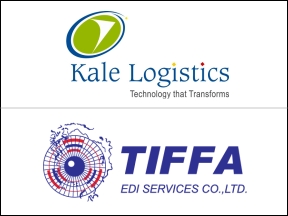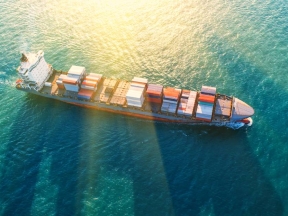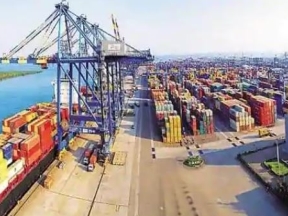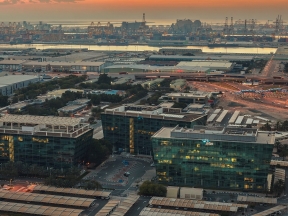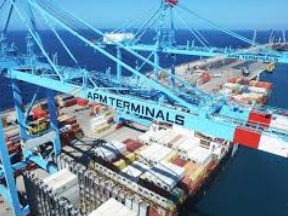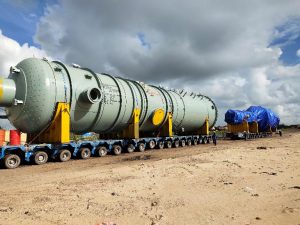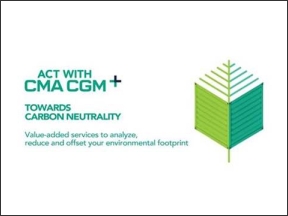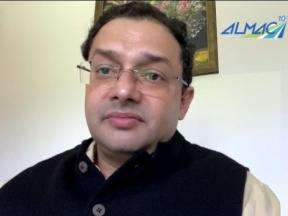TIFFA EDI Services and Kale Logistics Solutions have joined hands to promote paperless trade in the maritime sector of Thailand through their integrated and comprehensive Port Community System (PCS). The integrated platform empowers the SME players in the value chain to automate their internal business processes in an end-to-end manner. Kerry Siam Seaport, SITC Container Lines and Kline Logistics, have signed up this platform for e-DO services and many more are in the process of signing up. Talking about the development, Vineet Malhotra, Director, Kale Logistics Solutions, says, “Our relationship with Thailand and TIFFA is more than 7 years. We have empowered the air cargo sector with digitisation of air waybills and now we look at digitising the maritime sector. Our domain expertise and experience of working in 27 countries and executing global IT projects in maritime and air cargo space will add value to our PCS platform in Thailand. He further adds, “We are hopeful that this digital platform will play a key role in improving Thailand’s Logistics Performance Index (LPI) ranking with World Bank and Trade Facilitation Agreement initiatives with World Trade Organization (WTO)”. Expressing their delight over the development, Suwit Ratanachinda, Chairman, TIFFA EDI Services says, “We are offering this solution to ease all stakeholders with this challenging situation of risk from the COVID-19. The old-style Delivery Orders (DO) process which takes time and paper-intensive operations are prone to errors and increased the spread of virus through document exchange. The initiative of e-DO service is to facilitate ease of doing business to freight forwarders, shipping lines, transporters, terminal operators and Port authorities. This solution offers an open integrated platform connecting all cargo stakeholders on single platform for …
Read More »Ministry of Ports, Shipping & Waterways issues Draft Merchant Shipping Bill 2020, aims to repeal and replace the Merchant Shipping Act, 1958
Ministry of Ports, Shipping and Waterways has issued a draft of the Merchant Shipping Bill, 2020 for public consultation. It aims to repeal and replace the Merchant Shipping Act, 1958 (Act No. 44 of 1958) and the Coasting Vessels Act, 1838 (Act No. 19 of 1838). The Merchant Shipping Bill, 2020 has been drafted with the primary aim of promoting the growth of the Indian shipping industry by incorporating the best practices adopted by other advanced countries like the U.S., Japan, U.K., Singapore and Australia. All up-to-date IMO Conventions/protocols, to which India is a party, have been adopted in it. Adequate provisions are incorporated to ensure the safety and security of vessels, safety of life at sea, prevent marine pollution, provide for maritime liabilities and compensations, and ensure comprehensive adoption of India’s obligations under International Conventions. The envisioned advantages of the Merchant Shipping Bill, 2020 are following: • Promoting ease of doing business- The Bill does away with requirement of general trading license for Indian vessels • Embracing digital technology- It enables electronic means of registration, and grants statutory recognition to electronic agreements, records, and log books, in addition to electronic licenses, certificates and payments. • Increasing tonnage and Vessel as a Tradable Asset-The Bill seeks to increase India’s tonnage by widening the eligibility criteria for ownership of vessels and providing for the registration of bareboat charter cum demise, thereby increasing opportunities for international trade. • India as a Bankable Shipping Jurisdiction & avoidance of situations leading to wreck -The proposed Bill seeks to introduce for the first-time statutory framework for regulating maritime emergency response against maritime incidents. The provisions seek to provide for time effective implementation of response mechanisms …
Read More »APSEZ ranks 14th on global transportation of Dow Jones Sustainability Emerging Markets Index 2020, ranked in the top 20 of every dimension of 3 criteria
Adani Port & Special Economic Zones (APSEZ) has ranked 14th in the global transportation and transportation infrastructure sector and is the only company from India to have been included in this sector. This initiates the presence of APSEZ on the DJSI Emerging Markets Index, one of the most sought-after sustainability indices in the world that represents the top 10 per cent of the largest 800 companies within the world’s 20 emerging markets and is based on long-term Environment, Social and Economic, and Governance criteria. As part of a stringent DJSI rating process all responses by APSEZ were substantiated with internal documentation and real-life examples and audited by an independent third party to verify the accuracy of the information provided. APSEZ was ranked in the top 20 of every single dimension of the three criteria. In all, just 11 Indian companies made it to the DJSI Emerging Markets Index this year. Karan Adani, Chief Executive Officer and Whole Time Director, APSEZ comments “We are pleased to make an entry into the DJSI Index. As the largest multi-port operator and logistics player in one of the fastest growing markets in the world we recognize the complexity that we are confronted with and therefore being able to achieve this high ranking on our debut into the DJSI Index comes as a shot in the arm for us as well as validates our accountability to our investors, customers, and employees. While our Environment, Social and Economic, and Governance criteria scores are a strong validation that we are on the right path, we really see this as just one point along a more ambitious journey we have embarked on to demonstrate our absolute commitment to …
Read More »Jebel Ali Free Zone introduces ECI’s tailored solutions to establish the UAE as a preferred global hub for exports
Jebel Ali Free Zone (Jafza), DP World and Etihad Credit Insurance has showcased innovative trade credit and export financing solutions in a joint webinar. During a well-attended webinar titled, ‘Etihad Credit Insurance Collaboration: Trade with Protection’, Jafza-based companies were given a walk-through of ECI’s solutions as part of the Free Zone’s drive to ensure the growth of businesses, while lowering the cost of export, by reducing the risk of non-payments, and funding, by lowering banking pre and post-shipment funding in the current unprecedented economic climate Jafza has introduced ECI’s tailored solutions to support UAE-based businesses and increase trade by providing them with protection against commercial and non-commercial risks. More than 8,000 companies in the free zone are set to directly benefit from the strategic collaboration of Jafza and ECI, giving export businesses a major boost and a competitive edge in the regional and global markets. Jafza believes that Etihad Credit Insurance’s range of export credit, financing and investment insurance products will directly benefit Jafza’s customers, particularly the SMEs. The partnership will be a game-changer for the export of goods and services because ECI’s support increases cash flow, enables trade and contributes towards sustaining growth even as the markets recover. The shared objectives of ECI and Jafza represent the vision of the leadership to establish the UAE as a preferred global hub for exports. The Free Zone is working closely with ECI to take this partnership forward and reinforce their commitment to business continuity with confidence. In addition, ECI has issued more than 1,600 revolving credit guarantees for a total exposure amount of AED1.2 billion in the first half of 2020, which is equivalent to AED4 billion guaranteed non-oil trade coverage. …
Read More »Pipavav cuts terminal handling charges for empty containers by 25%, effective till December 31. 2020
APM Terminals Pipavav has announced that the port has reduced terminal handling charges for empty containers by a quarter to help the exporters, facing container shortage for overseas shipments. The charges have been revised downward from November 16 and will remain in effect till December 31, 2020. The move is aimed at supporting exporters in getting easy access to empty containers and reducing the waiting period. APM Terminals Pipavav is taking efforts to facilitate trade and help in reviving the economy amid a considerable imbalance in trade due to severe shortage of containers for exporters. “The Port has reduced the terminal handling charges for empty containers by 25 per cent to enable the exporters who are adversely impacted by the shortage of empty containers due to significant fall in imports,” APM Pipavav Terminals said. The reduction for handling charges on the tariff is effective for vessels sailing from November 16 to December 31. “Looking at the trade cycle adversely affected by the shortage of containers, we decided to assist the trade through a reduction in handling charges of empty containers. I hope this will support exporters in getting easy access to empty containers and reduce the waiting period, thereby addressing the critical issue of container shortage,” said Jakob Friis Sorensen, Managing Director, APM Terminals Pipavav. India’s exports during April-October period of the current financial year fell 19 per cent to US$ 150.14 billion, while imports declined 36.3 per cent to US$ 182.29 billion, citing data from the Ministry of Commerce and Industry. The country is facing a shortage of containers for exports as the containers that come in as imports are shipped out for exports, APM Pipavav Terminals said, adding …
Read More »Boxco Logistics successfully handles 9 heavy lift packages of IOCL MEG project at Paradip Port
Boxco Logistics along with Allcargo Logistics has successfully executed the first shipment of the IOCL MEG Project at Paradip for L&T Hydrocarbon Engineering (LTHE) who were the EPC contractors for IOCL. The shipment had nine heavy lift packages which were received safely on Boxco’s self-propelled modular trailers. The dimensions of the packages meant that certain modifications were required to be made to PICT which was carried out by Boxco. In addition, other civil modifications were also carried out enroute to the IOCL Site. The major challenge in transporting these packages was the route which passed through a live refinery road, which, was not strong enough for handling packages of this size. Boxco conducted a number of surveys and meetings with IOCL and LTHE personnel with the intention of finding a solution wherein the modification en route had to be minimised and the refinery also continued functioning without any shutdowns. There was another challenge for modification in the port itself for taking out these packages, we convinced the customs and took the permission for breaking the port wall and also made the slope to match the level difference between the port road inside the terminal and outside the road. Boxco made almost 27 major modifications en route to deliver this cargo. Boxco Logistics added this to a long list of complicated movements done in Paradip over the past 20 years. This contract also further strengthened the position of PICT as the terminal in Paradip for heavy lifts and over dimensional cargo the terminal has a strategic advantage because of its location. The state-of-the-art infrastructure makes it a terminal of choice for this type of cargo. The second shipment of this project …
Read More »Shankar Shinde elected as the MD of IFCBA, underlining the importance of FFFAI and India in international logistics business
Shankar Shinde, Chairman Elect, Federation of Freight Forwarders Associations in India (FFFAI) has been elected unanimously as Managing Director of the International Federation of Customs Brokers Association (IFCBA). IFCBA enjoys the status of Private Sector Consultative Group (PSCG) representation on World Customs Organisation (WCO).The election of Shinde in IFCBA’s crucial position once again underscores the growing importance of FFFAI and India at large in the international Logistics & Customs Brokers business. Having more than 30 years of experience in Logistics and Customs Broking industry Shinde is very well-known for his huge contribution to the entire industry. Apart from FFFAI and IFCBA, he has also been associated with various industry associations including Nashik Customs House Agents Association as President, International Federation of Freight Forwarders Associations (FIATA) as FFFAI nominated representative, Brihanmumbai Customs Brokers Association, Maharashtra Chamber of Commerce & Agriculture, etc. In addition, from FFFAI Shinde is spearheading the International North South Transport Corridor (INSTC) project collaborating with the Government of India. “The international trade community depends on the work done by Customs Brokers and IFCBA serves Customs Brokers by keeping them at the centre of the international trading system. It is IFCBA’s mission to promote the value and use of Customs Brokers worldwide,” emphasized Shinde while commenting on the importance of IFCBA. IFCBA works to bring about improvements in Customs policies and best practices on a global basis. These improvements benefit both Customs and Customs Brokers for achieving transparency in trade facilitation measures, brainstorming towards innovation for recommendation of seamless cross border customs processes and standardization with use of technology in achieving paperless transaction.
Read More »CMA CGM launches ACT with CMA CGM+, enabling its customers to make their cargo carbon neutral
h an aim to help its customers to lighten their environmental footprint and make their cargo carbon neutral, the CMA CGM Group has announced that the group is launching ACT with CMA CGM+, an array of solutions. Available throughout all the Group’s shipping subsidiaries, this new offering consists of four services, enabling its customers to analyse their environmental footprint, use cleaner alternative energy sources and to offset the emissions generated during the transport of their goods. Cleaner Energy LNG and Cleaner Energy Biofuel: Two solutions delivering reductions in environmental footprint CMA CGM made the groundbreaking decision to power 26 of its containerships using liquefied natural gas by 2022, and seven of these are already in service. Thanks to the CLEANER ENERGY LNG offering, customers will be able to choose to transport their goods using LNG, a novel technology that helps to preserve air quality by eliminating almost all atmospheric pollutants. Through its greater energy efficiency and the use of renewable biomethane sources, this offering also delivers a significant reduction in greenhouse gas emissions. CMA CGM was also the first shipping group to successfully use biofuel on its containerships. Thanks to the CLEANER ENERGY BIOFUEL offering, the Group’s customers will be able to opt for a transport solution for their goods using biofuel generated from used cooking oil. These alternative fuel-based solutions can unlock reductions in greenhouse gas emissions of between 15% and 85%, providing CMA CGM’s customers with a wide range of solutions to decarbonize their cargo. Eco Monitor and Positive Offset: Two solutions for analysing and offsetting environmental footprints With Eco Monitor, the CMA CGM Group’s customers will be able to keep track of their environmental footprint in real …
Read More »Revised policy for CFS/ICD/AFS will address overcapacity concerns in the industry and is credit positive: ICRA
The Central Board of Indirect Tax and Customs (CBIC) has notified revised policy and guidelines for setting up of Container Freight Stations (CFS), Inland Container Deport (ICD) and Airfreight Stations (AFS). The revised policy aims to boost investment in CFS/ICD sector in underdeveloped regions in India, while the approvals in regions where already high concentration is there will be discouraged except in exceptional cases. Commenting on the policy, K Ravichandran, Senior Vice President and Group Head, Corporate Ratings, ICRA, says, “The new policy considers the issues faced by the sector; including regional disparities in concentration of facilities, with high concentration of CFS in Western and Southern regions and the adverse impact of new initiatives like Direct Port Delivery (DPD)/ Direct Port Delivery (DPE) on the CFS sector. While, the impact on volumes due to DPD implementation has stabilised to some extent, the margins have witnessed pressure and with growing investments in warehousing space, only CFS players with larger logistics offerings allowing them to re position their services will be able to continue in the long term. Hence, the zoning and distance rules in the revised policy will aid in more balanced development in the sector and prevent concentration of facilities which will improve the viability of existing/upcoming facilities by reducing competitive pressure.” ICRA notes that the revised policy has factored the developments in the sector in the last two decades, including the growth in volumes during this period; geographical concentration of CFS/ICD; implementation of schemes like DPD/DPE and other automation and efficiency improvement measures; and also, the infrastructure developments like Direct Freight Corridor and inland waterways.
Read More »ALMAC Online opens; It is not govt business to govern the industry, we have to self-regulate ourselves, says, AMTOI Vice President
The 10th Asian Logistics, Maritime and Aviation Conference (ALMAC), an annual signature event for the industries jointly organised by the Government of the Hong Kong Special Administrative Region (HKSAR) and the Hong Kong Trade Development Council (HKTDC), opened today, running online for the first time in light of the pandemic. “The year 2020 has been a landmark year in many aspects, perhaps the most challenging year we have faced in our lifetime,” says, Xerrxes Master, Vice President, Association of Multimodal Transport Operators of India. Explaining the nature of Indian logistics industry, he continues, “The size of the Indian logistics industry is US$250 billion; it’s a highly fragmented industry with hardly 10-15 per cent owning by organised players. So, one can imagine the magnitude and sheer scale of industry and what it is really capable of. However, slow but steady the progress has been made at every step. Indian government, in the last five to 10 years, has really supported multi-modalism; one of the prime examples is the development of inland waterways and the coastline which has been neglected all these years and which has really not being used to its full potential. It is estimated that 14500 kms length of rivers are navigable throughout the year. The Inland Water Authority of India (IWAI) has declared five national waterways covering a total of 4,434 kms of inland waterways covering routes on river Ganga , river Brahmaputra , back waters of Kerala, Krishna and Godavari river system along with the Buckingham Canal and Brahmani Mahanadi river system along with East Coast Canal. In 2016 the government of India declared 106 navigable rivers as National Waterways also. India and Bangladesh have agreed upon …
Read More » Cargo Breaking News
Cargo Breaking News
